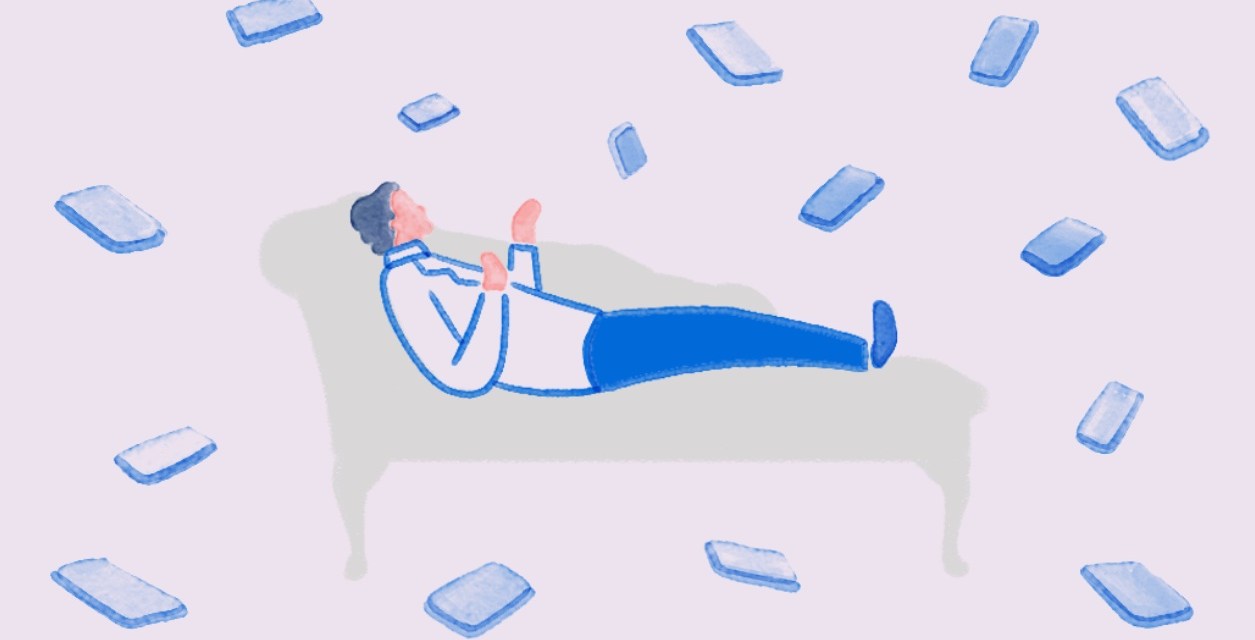Caregiver concierges, psychedelic therapy, sleep programs: Companies strive to offer innovative mental health benefits

When it comes to office perks, the ping pong table is out; pet therapy is in.
For employers, the calculus is simple: Mental health = wealth. That’s because there’s a well-studied correlation between psychological well-being and employee retention, improved performance and productivity. Digital therapy service Talkspace commissioned a survey that found 66% of people who are considering quitting are likely to stay in their current position if they receive more mental health services. There’s an obvious incentive for businesses to ensure their employees’ emotional equilibrium.
Conversely, a lack of mental health support for workers will likely result in consequences felt on the bottom line. Per a study cited by the CDC, employees at high risk for depression amassed the highest health care costs, even after taking risks like smoking and obesity into account. One of the biggest expenses for many employers is the combined cost of sick days and lost productivity associated with mental health, according to CNBC.
“Following the pandemic,” said Talkspace’s vp of clinical engagement, Laura Magnuson, “the mental health of employees became a must-have, not a nice-to-have benefit for employers.” Therefore, it’s no surprise that 84% of employers plan to increase or enhance employee mental health benefits in the next year.
And in the innovation age, they’re discovering all sorts of interesting ways to do just that.
FaceTiming Dr. Freud: outsourcing, apps and virtual therapy
In the Zoom era, traditional Employee Assistance Programs implemented by in-house HR departments are insufficient and obsolete.
Major companies like Lyft, Dropbox, Chipotle, British Airways and Live Nation — to name a few — have outsourced the design and delivery of mental health benefits packages to subcontractors. These smaller companies serve as all-inclusive wellness platforms and portals, connecting employees to a vast array of counseling services and calming digital content.
Some of the more well-known include: Modern Health, Aduro, Unmind, Vida Health, Optum, Noom, and Caravan Wellness. Their core purpose is to enable employees to access (on a voluntary basis) a network of international, licensed mental healthcare providers. Workers and their dependents usually get a limited number of free, one-on-one, virtual therapy or coaching sessions.
This counseling can be culturally-centered and delivered via text or video call in myriad languages from — and to —anywhere in the world. With Modern Health, for example, the wait time to be matched with a therapist is typically less than 24 hours. “We are really proud of our ability to connect people to care within a day,” said the company’s vp of professional services, Sam Hanna.
Many of these companies also offer professionally-mediated group therapy. Modern Health facilitates virtual “Circles” on specific, culturally-centered topics like “Combatting Anti-Asian Racism” which takes place on Sept.22. Talkspace recently hosted a grief webinar on behalf of a municipal fire department client which lost a firefighter in the line of duty, providing support to the impacted service members and their families. The platforms may also partner with crisis helplines, so employees can access emergency mental health or substance use disorder support 24/7/365.
These interfaces also brim with self-help content, boasting online libraries featuring meditation protocols and science-backed advice videos. Caravan Wellness, for example, offers soothing instructional videos on focus, sleep, financial wellness, and more.
It all sounds optimal. But does it work?
Well, at the very least, the benefits of individual therapy are quantifiable. According to Modern Health’s data, users with elevated depression scores experienced a 76% improvement, on average, in their well-being after one-to-one care, while 58% of patients with depressive symptoms experienced clinical recovery after one session with a certified coach. At Dropbox, 91% of employees who engaged with therapists/coaches reported improved well-being, according to the company.
And yet, experts say employers must do even more.
All the virtual cognitive behavioral therapy or app-guided self-tapping (a meditative technique involving tapping parts of the body to relieve stress) in the world won’t compensate for an exploitative pay structure or rotten-to-the-core corporate culture. “Companies can offer a robust set of mental health resources and still end up with burnt-out, miserable employees if they aren’t investing in regular compensation reviews, manager training, and realistic workload expectations,” said Kate Beckman, executive manager, community and Insights at Gen Z recruitment firm RippleMatch. “A web page detailing mental health resources is rendered useless if employees are experiencing high levels of stress in a toxic environment.”
There is often a disconnect between an employer’s ideals and its on-the-ground lived realities. “Even if a company offers unlimited mental health days, it can be stressful to take time off if a workload isn’t actually reduced,” added Beckman.
In the end, breathing exercises and animal-assisted therapy like goat yoga won’t do much to thwart a toxic boss. To quote Taylor Swift, band-aids don’t fix bullet holes. Tech-based wellness solutions simply can’t make the biggest impact on improving employee mental health; you need humans for that.
A top-down approach
“Even in the most progressive workplaces, many employees keep their [mental health] conditions secret,” wrote psychiatrist Dr. Don Mordecai, national leader for mental and behavioral health at healthcare firm Kaiser Permanente in a post in 2019. “They may be afraid that being open about them will hurt their reputation, compromise work relationships, or even jeopardize their job. This can prevent employees from seeking help and getting better.”
De-stigmatizing mental health concerns is an inside job. It often starts with leaders who set the cultural tone and prioritize the cause. “One good thing that came out of the last couple of years is the shift in conversation around workplace mental health,” said Hanna. “Employers, including C-suite leaders, are more open about their own struggles and creating an environment where employees can be honest about their needs.”
Andy Dunn, cofounder of clothing brand Bonobos, released a book this past May called Burn Rate, detailing his struggles with Bipolar disorder. Barclay’s private bank vp Tom Doan has been outspoken about the psychiatric breakdown he experienced in his 20s. He is now an advocate helping to shape the bank’s mental well-being strategy. Barclay’s This is Me initiative “encourages colleagues to tell their personal stories, changing perceptions of disability, mental health and neurodiversity in the workplace.” Likewise, employees at Microsoft are encouraged to share their mental health stories on the company blog.
Out-of-the box benefits: the good, the meh and the gimmicky
Innovations in mental health benefits range from wonderful to wacky.
Soap company Dr. Bronner’s offers its employees psychedelic therapy. Media company Hearst’s benefits include divorce support. WD-40 bestows upon its altruistic workers “Mother Theresa Awards” for dedication to community projects. Cambridge, Mass.-based tech company Akamai has offered pet therapy, employee scavenger hunts, a multi-week sleep improvement program, and Qigong workshops—all coordinated by its on-staff Wellness Program Manager.
Cisco — whose CEO Chuck Robbins sent his 75,000 employees an email about prioritizing mental health in the aftermath of Kate Spade and Anthony Bourdain’s tragic suicides — offers a comprehensive benefits program that exceeds industry standard. It includes explicit support for parents of children with developmental disabilities like Autism, paid time-off when employees become grandparents, “Caregiver Concierges” who help source, train and place providers of child- and eldercare, college counseling sessions for families with high school students, and a mandated 10-day end-of-year shutdown that requires employees to actually take their vacations; there’s no chance of working through the holidays, because Cisco’s North American offices are all closed. It is also ongoing practice for the company to have licensed mental healthcare providers attend its employee meetings, if the circumstances or attendees require professional support. (Cisco has also incorporated Goat Yoga into its corporate events.)
American Airlines not only offers employees 24/7 access to a helpline, but also installs licensed mental healthcare providers on site at major airports from coast to coast and encourages employees to call upon them.
Taylor Shupe, former vice chairman of Adidas-Kanye West-founded sneaker brand Yeezy, is the founder and CEO of knits manufacturer FutureStitch, which collaborates with brands like TOMS, Crocs and Everlane. FutureStitch’s mission is to recruit and employ formerly incarcerated women (whose 35% unemployment rate is significantly higher than the national average) in manufacturing positions at its Oceanside, Calif. factory. The company provides therapy and housing support, along with yoga, meditation, cooking and crafting workshops. Employees recently built vision boards together, at the suggestion of one co-worker, who led the session. “It is super important to FutureStitch to build meaningful, mental health programs that bring justice-impacted women joy, and make a real impact in their lives,” said a FutureStitch spokesperson.
Still, even the most well-intentioned CEO implementing the best possible benefits can only help heal employees who are set up for success.
RippleMatch research has shown that Gen Z workers expect the full package: mental health resources in a workplace that provides fair compensation, career growth, and flexibility, according to Beckman. “This generation knows that a meditation app won’t fix a toxic workplace, and won’t reduce the stress that comes with struggling to pay rent,” she said. “Gen Z’s desire for financial security even outweighs the importance of inclusive cultures and mental health resources.”
Opening up in therapy is great. But money talks.


